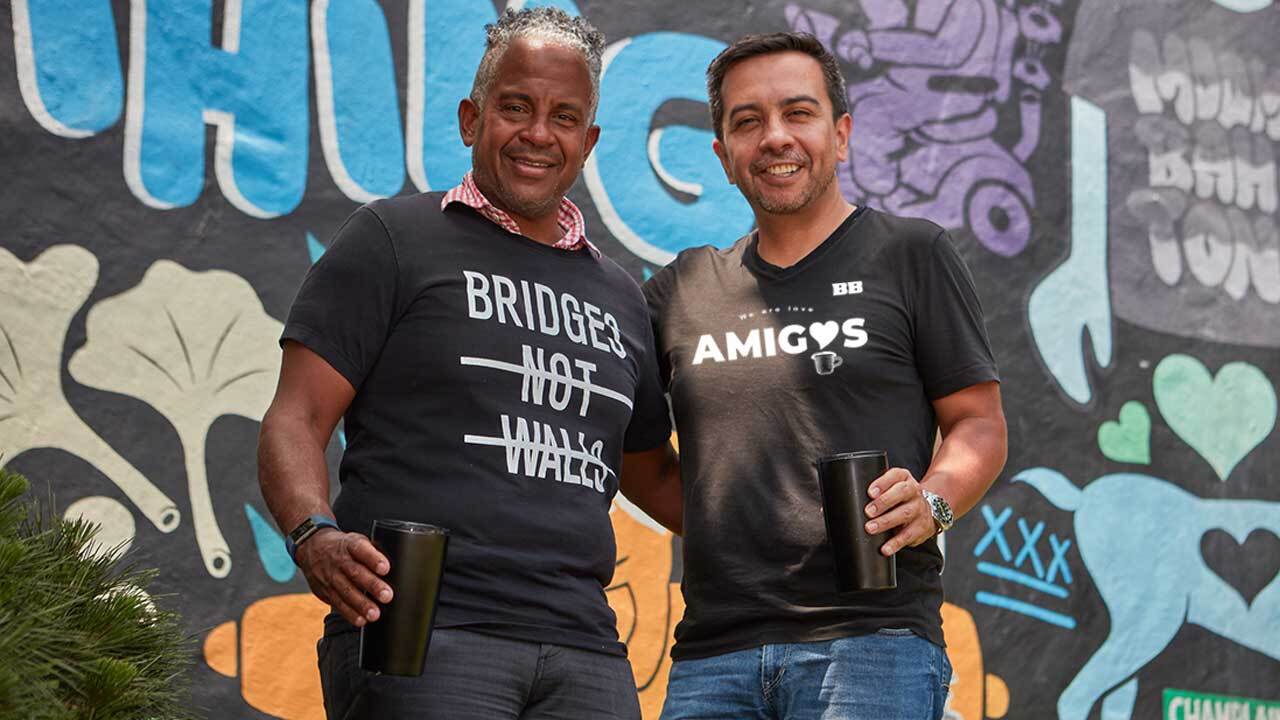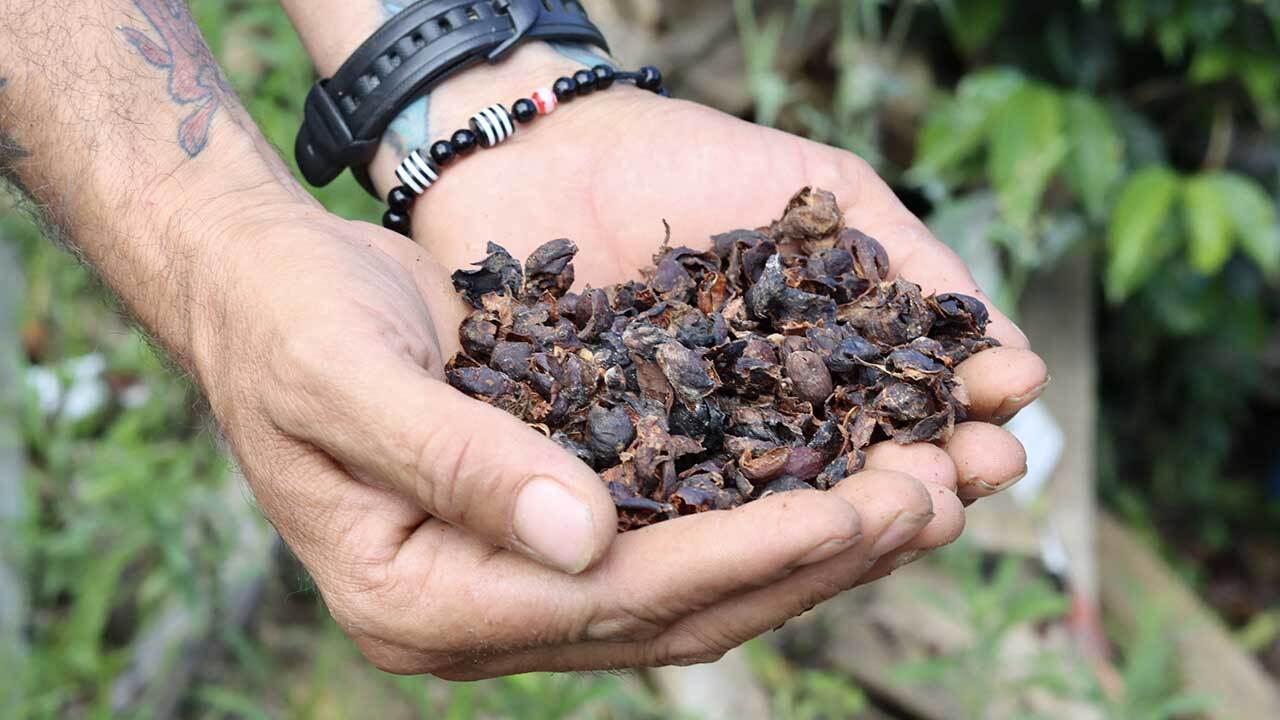Back

Blog
Black & Brown Coffee: Ethically-Sourced & On a Mission
Globalization is deepening its roots across the world, having a major impact on the way people think and make decisions—including where and how they choose to spend their money. With technology’s increasing presence in our lives, information is spreading faster than ever, and social media is opening a wider view into the inequitable structures set up to maintain systems of oppression and deepen the racial wealth gap. As a result, people are searching for ways to make a difference, increasing the demand for ethically-sourced products from companies that uplift working class communities of color. Black & Brown Coffee seeks to do just that.

The coffee industry, like so many other industries today, largely benefits rich corporations and wealthy foreign investors, leaving local farmers—those putting in the most work to cultivate land, harvest cherries, and roast the beans—to hardly see any profit.
Karel R. Leon, an alumnus of ICIC’s Inner City Capital Connections program (ICCC Northern Virginia 2021) is a native of Colombia and co-founder of Black & Brown Coffee House, a minority-owned roasting brand that focuses on empowering coffee producers, based in Arlington, VA.
“Colombia has about 600,000 families who depend on [the coffee industry]. And if you want to talk about products or commodities that exemplify the inequalities in Colombian communities, it’s coffee, chocolate, and tea. The dynamic of how those [products] are sourced and distributed and who keeps what—that was inherited by the European colonizers,” explains Leon.
Consumers are becoming aware of where their money is going, and how their spending decisions can be helpful (or harmful) to peoples around the world. With cheap goods becoming more accessible than ever through online shopping, it has become increasingly obvious that many major corporations source their products unethically, capitalizing on cheap labor and lacking environmental regulations to meet their bottom line.

Coffeehouses like Black & Brown Coffee, however, specifically fight back against this reality. With his vast knowledge of the industry and long time love for agriculture, Leon and his co-founder Javier Llano created their coffee company.
“The passion for farming started when I was six or seven. My grandma was a farmer,” Leon shares, “[she] was a strong community leader in the town where she was, and I saw that example of a dignified farmer that we don’t see often. She was someone important…, someone people would listen to.”
For Leon, farming is more than a job or hobby—it’s in his blood.
This familial tradition led him to work with the Ministry of Agriculture in Colombia after he graduated school. He says, “I worked there for five years, and every day I was driving to the poorest communities…and little by little I started to realize many people just needed hope, or connections, or a better way to do things… and it wasn’t so hard to help them out of the line of poverty.”
Unfortunately, Leon explained, Colombia is facing more than poverty, estimating “about 200,000 [citizens] have died because of the drug wars.” Because coffee corporations keep farmers below the poverty line, many turn to the drug trade just to make ends meet. Leon points out, “It is proven that [per $3.75 cup of coffee at a major corporation such as Starbucks] a farmer gets probably 1-2 cents. And the farmer is the one who really puts in the most work [to that cup of coffee].”
During his tenure in the Ministry of Agriculture, Leon saw how easy it was to short farmers the money they were owed. He explains that many times, farmers are forced to accept unfair deals and sell their products for less than they’re worth or risks going without any kind of pay.
On top of all of this, cultivating coffee is painstaking, long work. Leon provides some insight into the process, explaining that the cherries that contain coffee beans take at least 1-2 years to bloom, 150 of which are needed to produce a single cup of coffee. He says there’s only one way to understand just how cheated coffee farmers are, and that’s to, “go to Colombia, go to a coffee plantation and pick 150 [cherries] on a stiff hill with the spiders and the snakes.”
Leon saw a solution; that the best way to directly support farmers was to provide grants and equipment–a solution that may seem simple, but one that can genuinely uplift local workers. He pivoted to the coffee industry in order to affect change quickly for farmers. Keeping things simple, his coffeehouse works directly with coffee farmers and pays them what they deserve.
Inundated with cheap goods from big corporations who achieve their goods/profits through less-than-ethical means, trying to shop conscientiously can be overwhelming. However, according to Leon, that awareness is the only way to move the needle forward—slowly but surely.
“You shouldn’t be shy about it,” he says. “Many people don’t care because ‘it’s just coffee’…Believe in what you’re doing and don’t be shy about it.”
For business owners, he emphasizes that “finding the right partners is important…it’s very hard to sell these things to the big retailers [who are most interested in making money]…Find your niche. What’s most important is knowing what the product’s about.” Leon’s answer? “Coffee is about community.”
So, while it’s difficult work, Leon urges that spending ethically when possible and working with companies that share your values is worth the effort. Products that are sourced ethically at every stage of the supply chain are hard to come by these days, but if we all committed then more and more ethically-sourced goods would make their way to the forefront of our marketplaces.
Uplifting workers, helping the environment, all while shopping guilt free and sleeping a little better at night? Now that’s a win-win-win!
Black & Brown Coffee House is a Black and Latino-owned coffee roaster who serves pure, single-origin Colombian coffee based in Arlington, VA. They also offer wholesale coffee products that the entire office can feel good about. Visit https://blackbrowncoffeehouse.com/ to learn more.
Karel Leon is an alum of ICIC’s Inner City Capital Connections (ICCC) program. To learn more about the program, click here.
